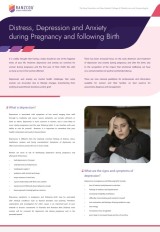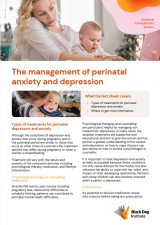If you're a frequent visitor to Healthify, why not share our site with a friend? Don't forget you can also browse Healthify without using your phone data.
Perinatal depression or anxiety
Includes depression and anxiety experienced during pregnancy and after the birth of a baby
Key points about perinatal depression or anxiety
- Perinatal depression or anxiety is depression or anxiety experienced during pregnancy or within the first year or so after childbirth. It can also happen after a miscarriage.
- It's more common than most people realise. It has the same symptoms as depression or anxiety at other times of life but can be harder to recognise when you're very tired and going through a major life change.
- About 10% of fathers may also develop perinatal depression and or anxiety.
- With treatment and support, you can make a full recovery.

Most parents experience a degree of worry with ups and downs in their mood when expecting a baby or coping with a newborn. Postnatal or maternity ‘blues’ are very common and involve a brief period of the mother feeling down and tearful in the week or two after her baby is born. This feeling passes after a few days.
However, some parents develop a more pronounced anxiety or depressed mood that affects their daily life and functioning. This is known as perinatal depression or perinatal anxiety. These are much more serious conditions, and you can become seriously depressed or anxious. This can start during pregnancy or in the months following childbirth.
Postnatal psychosis (sometimes called postpartum psychosis) is rare, affecting about 1 in 1000 people. It involves symptoms of psychosis (being out of touch with reality) associated with significant changes in mood – either a depressed or an extremely high mood. It usually begins in the first 2 weeks after your child is born. Read more about postnatal psychosis(external link).
Perinatal obsessive-compulsive disorder (OCD) affects about 2 to 3% of mothers. It often involves ritualised behaviours to control anxiety. Read more about perinatal OCD(external link).
What about fathers?
Research suggests that about 10% of men experience depression during the first year after the birth of a child.
Some new fathers appear to be more vulnerable to depression than others. Being young, unemployed and/or having financial problems when the child is born increases the risk of depression after becoming a dad. It may be that young fathers are more at risk because being young might mean that it’s less likely that the child was planned. A young dad might not feel ready to take on the new responsibilities that come with fatherhood.
If the new mother is depressed, this might make the role as a father more stressful.
There hasn't been much research about dads' experiences of anxiety, but it's clear that anxiety can be very hard to deal with, particularly when you've got the big new responsibility of caring for a baby. Some worry is inevitable, but if the worries are getting in the way of things like sleep, eating, or getting things done, it's time to talk to someone about it.
The information on this page applies to any parent dealing with mental health concerns during pregnancy and after the birth of the pēpi. However, there is support available specifically for fathers. See the support section below.
About 10 to 15% of women will develop anxiety or depression in the months after the birth of a baby. It may also start during pregnancy, and, if untreated, continue and perhaps get worse after the baby is born.
Perinatal depression or anxiety is likely to be associated with several factors, such as:
- your previous history of anxiety and depression
- having had severe premenstrual syndrome (PMS)
- having an unplanned pregnancy or being very young and not feeling ready to be a parent
- relationship difficulties, especially with the father of the baby or with your own mother
- factors in your environment, such as how much other stress there is in your life (eg, money or housing problems) and how much support you have.
Being pregnant, giving birth and becoming a parent all require you to make many adjustments and provide stressful situations to be coped with. It’s not surprising then that people who have extra things to deal with in their lives are at greater risk of developing perinatal depression or anxiety. The hormonal changes your body goes through may also contribute to feelings of anxiety and depression.
As well as the general risk factors listed above, other things may make it more likely for you to have perinatal mental health concerns.
Risk factors related to pregnancy and birth include:
- previous loss, including infertility, IVF, miscarriage, termination, stillbirth or death of a baby
- birth complications, such as Caesarean delivery
- the birth not going as planned (eg, birth in hospital or with intervention when a home or natural birth was hoped for)
- having a brain-damaged, disabled or ill baby.
Risk factors after birth include:
- having a baby in neonatal intensive care (NICU)
- relationship difficulties
- underlying medical problems, such as diabetes, high blood pressure, etc
- a baby that is fussy, has problems feeding or has colic or reflux
- isolation and lack of social connections.
Getting help early can reduce how severe your symptoms get and improve your chances of a faster recovery.
The signs or symptoms of perinatal depression are similar to those of depression at other times of life. Not everyone with depression will feel sad or persistently down. Symptoms can vary from person to person and over time. It can be difficult to tell, especially in the weeks and months after a baby is born, whether fatigue, self-doubt, and worry are normal or are signs of depression and/or anxiety.
The symptoms of depression include those related to :
- your feelings (mood)
- your body (physical)
- your thoughts and beliefs (cognitive).
For a diagnosis of depression to be made, mood symptoms and some or all of the other signs must have been present for at least 2 weeks.
Mood symptoms
- Persistent low, sad or depressed mood: You may feel sad, empty, or numb (have no feelings), or have pain that’s hard to describe or locate. You may cry for no apparent reason. You may feel sad or low in mood all of the time, or have times when your mood is more normal but the periods of feeling good don’t last for very long. People from different cultural backgrounds may have different ways of describing or expressing this. For example if you’re Māori you might think of it as feeling wainuku, whakamā or whākamamae.
- Loss of interest and pleasure in usual activities: This when you don’t enjoy the things you would usually find pleasurable as much or at all. You may lose interest in sex, although this often happens for a while after childbirth as a result of hormonal changes.
- Irritable mood: This may be the main mood change for some. You may feel angry, short-tempered and irritable. If it continues, it can make dealing with the frustrations of caring for a baby very difficult, and may also affect your other relationships.
Physical symptoms
- Change in sleeping patterns: The most common change is reduced sleep, with difficulty getting to sleep, disturbed sleep, and/or waking early and being unable to return to sleep. Although you’re likely to be woken up at night by your baby, if you have postnatal depression you may find it hard to sleep even when your baby is settled. For example, you may lie awake worrying about the next feed or the next day, or even what you’ve done in having your baby.
- Change in appetite: You may not feel like eating and lose weight. However, you may have increased appetite, even if you don't find pleasure in eating.
- Decreased energy, tiredness and fatigue: This may be so bad that even the smallest task seems like too much, making it really difficult for you to care for your baby and any other children.
- Physical slowing or agitation: This often comes with severe depression. You may just sit in one place for periods and move, respond and talk very slowly. Alternatively you may be unable to sit still and want to be on the move and wring your hands. You may swap between these two at different times.
- Bodily symptoms such as generalised aches and pains, headaches and generally feeling unwell.
Cognitive symptoms
- Thoughts of worthlessness or guilt involve a loss of self-confidence and you may dwell on things that happened in the past. As a result of feeling bad about yourself, you may withdraw from doing things and from contact with others. You may also feel you’re a bad mother.
- Thoughts of hopelessness and death and feeling there's no hope in life. You may wish you were dead or have thoughts of suicide. While many people with postnatal depression have thoughts of harming themselves (and sometimes their baby), often it's not that they actually want to die or hurt the baby, but rather they want the situation to change.
- Difficulty thinking clearly and concentrating. You may not feel able to read or watch television. You may also have great difficulty making even simple everyday decisions.
- Anxiety symptoms of various kinds are also very common as part of depression (80 to 90% of people with depression) but as the depression improves, these symptoms may also improve. If not, you should seek treatment for anxiety. Anxiety symptoms may include:
- Excessive worry or fear – you may have tense muscles, a pounding heart ort dry mouth. The focus of your worry may often be your baby.
- Panic symptoms or even panic attacks – with sudden episodes of extreme anxiety and panic and physical symptoms of fear. You may feel panicky about your baby. Read more about panic attacks.
- Phobias – specific fears about situations, fear of open spaces, confined spaces, heights, objects, animals or creatures such as spiders. Read more about phobias.
- Excessive concern about physical health – you may worry that you're ill or that your baby has something terribly wrong with them.
If you're concerned and think you (or someone you care about) may have perinatal depression or anxiety, talk to your midwife, healthcare provider, Plunket nurse or Well Child Tamariki Ora provider.

Image credit: Freepix
Wondering if you have perinatal depression or anxiety?
The following online self-tests give an indication of your mood and whether you would be advised to seek help:
- Edinburgh Postnatal Depression Scale self-test
- Depression self-test(external link) from the National Depression Initiative
- Anxiety self-test(external link) from the National Depression Initiative
Note: These are screening tests only and the results don't provide a diagnosis.
There's no medical test that can diagnose perinatal depression. To make a diagnosis, your healthcare provider needs to know all about the difficulties you’re experiencing. They will ask whether you have any of the signs of depression listed above. You may find it helpful for your family/whānau or a close friend to be involved in this discussion.
You may fear that your baby will be taken away if you admit to feeling depressed, anxious or having distressing thoughts (eg, about harming yourself or the baby). This is an understandable worry, but it's very rare for a mother to lose care of her baby because of depression or anxiety. The most important thing is to take care of yourself so you can take care of your baby, and asking for help and being honest about your feelings is the first step.
I don't think I'm depressed or anxious, but I'm struggling – what can I do?
Many parents are surprised by how difficult they find adjusting to their new roles as parents or to the birth of another child. It’s common for mums (and dads) to feel overwhelmed and out of their depth.
If you’re finding parenting hard and need extra support, talk to your midwife, doctor or Well Child Tamariki Ora provider. There are many services available that can make all the difference when you’re struggling. The sooner you talk to someone and get some extra supports put in place (eg, a parenting group, a meal train or an online discussion group) the sooner you’ll start to feel better.
Perinatal depression or anxiety are not only distressing conditions, they can also really get in the way of your being able to do the things you want and need to do. The earlier you get help the better. If perinatal depression or anxiety is acknowledged and addressed, it's likely to pass sooner and be less severe than if you get no help. It's then also less likely to affect the relationship you have with your baby.
Many healthcare providers are familiar with these issues and they can provide you with support in several different ways. These may include your GP, nurse, midwife, counsellor or complementary practitioner.
Research suggests that the treatment most people prefer for perinatal depression or anxiety is a combination of practical support and advice, talk therapies and support groups. If necessary, medications may be helpful.
Counselling and talking therapies
A range of talking treatments have been shown to work for all types of depression and anxiety. Cognitive behaviour therapy is one of the most well known. Talking therapies are provided face-to-face, through telehealth, in a group or through online programmes.
Often you can refer yourself to a private counsellor or psychologist. For funded services, talk to your healthcare provider about options in your region and ask for a referral.
Education and courses
Learning about perinatal depression and anxiety can you understand what you are experience and can be a huge help in your recovery. Your healthcare provider will be able to give you information about perinatal depression or anxiety, suggest ways to cope with it and discuss any complications that could happen. There are also online courses you can take or ask your midwife or doctor about courses or groups in your area. Just a Thought(external link) provides structured self-help modules on anxiety, depression, and stress, including perinatal.
Medication
Sometimes medication is helpful or needed. Talk about the pros and cons with your doctor or nurse prescriber and together find one that works for you and has the least side effects for your baby.
If you start taking antidepressant medication, keep taking it every day. It takes several weeks to work and most side effects are mild and go away with time. If you have any concerns about possible side effects, talk to your pharmacist or prescriber right away.
Read more about some of the common myths of antidepressants(external link).
Complementary therapies
The term complementary therapy is generally used to indicate therapies and treatments that differ from conventional Western medicine and that may be used to complement and support it.
Certain complementary therapies may enhance your life and help you to maintain wellbeing. In general, mindfulness, hypnotherapy, yoga, exercise, relaxation, massage, mirimiri and aromatherapy have all been shown to have some effect in reducing mental distress. Whenever you're thinking about taking any supplement, herbal or medicinal preparation talk to your healthcare provider first to make sure it's safe and won't harm your health, such as by interacting with any other medicines you're taking.
If you have depression or anxiety, it can be hard to do the specific things you need to do to take care of yourself. Your motivation tends to disappear, leaving you stuck in a whirlpool of negative thoughts about yourself, your baby and your world.
You might feel quite overwhelmed with a loss of self-confidence and a sense that you can't do or change anything. Your thoughts may be full of "have to" and "should" but at the same time you may feel unable to do the things that will help you feel better. It's hard, but even small steps can help. Look at the suggestions below, and see if you can try 1 thing every day to take care of yourself. Remember, taking care of yourself is a way of taking care of your baby too – you need each other, and will both feel better for it.
Self-care ideas
From the following ideas find what works best for you when you feel down or anxious. You may find it helpful to develop a list of things that help you and keep it pinned to the fridge.
- Track your mood: You may find there are times of the day when you feel better and can get more done. Likewise, you may find triggers or activities you find more draining. Discuss these findings with your healthcare provider.
- Keep active: Physical activity is very helpful for everyone and is an excellent way to help manage anxiety and low mood, reduce stress hormones etc. Get outside in the daylight. Notice the sights and smells and living things you see. Especially if you're having trouble sleeping, some natural light in the morning may help your body and mind.
- Work on putting good sleep routines in place: While interrupted sleep is normal once you have a baby, there are things you can do to get into a good sleep routine. Try to catch up on broken sleep when your baby is sleeping. Or ask somebody else to do some of the chores or take your baby for a walk while you have a rest. If you’re having trouble getting to sleep, talk to your healthcare provider.
- Structured problem-solving: Some people are naturally good problem solvers. Most of us are not when we are tired, stressed or depressed. Try to break down problems into smaller steps so they're easier to work on, and ask others to help you.
- Plan activities: Plan some specific 'you time' activities a week ahead. Having something to look forward to, someone to catch up with, or some relaxation time while someone cares for baby are all great ways to improve balance and wellbeing. Planning ahead and writing it down also helps with getting the day-to-day activities done. Set yourself small goals each day, goals you can achieve and feel good about.
- Develop a good support system: This is so important. Reach out to friends and whānau, accept their offers of help and build your support network. Join a local mothers' group, playgroup or coffee group. Ask your Plunket Nurse(external link) or join Mothers Helpers private Facebook group(external link). Spend time with people who make you feel good and can give you emotional support.
- WRAP: Wellness recovery action plan: Write a list of things that help you when you're having a bad day or feeling down eg, ring a friend, take the baby for a walk, play some music, dance, do something creative, put some nice clothes on and do your hair, do some journaling, join a class and learn something new.
- Find ways to give and help others: There's always someone worse off and better off than yourself. Look for little ways to help brighten someone else's day and you may find it also brightens yours.
See more tips to cope(external link).
Apps reviewed by Healthify
You may find it useful to look at some anxiety apps, depression apps and mental health and wellbeing apps for pregnancy and postpartum depression.
The length of time parents are affected by perinatal depression or anxiety varies. Without treatment, it may continue for 6 months or more. With treatment, 70 to 80% of parents will recover much sooner. Most people make a complete recovery.
If you’ve tried a treatment for several months and you're not feeling better, talk with your healthcare provider and try something different. Different people respond to different treatments, so don’t give up – keep asking for help.
If you get treatment early, it increases the chance of full recovery. Some people have a single episode and remain well following the birth of future children. However, some will have postnatal depression or anxiety following any future births, particularly if you still have the same risk factors in your life. Others will go on to have other episodes of depression outside of the specific perinatal period.
Video: Serene and Jo – postnatal anxiety and depression
Video: Luke Tiller – fathers and postnatal depression
(Kai Rua, NZ, 2021)
Links to the other 5 videos are provided below:
Maternal experience – Aaliyah(external link)
Maternal experience – Nix(external link)
Maternal experience – Sau(external link)
Maternal experience – Justeena(external link)
Maternal experience – Maa(external link)
Sometimes people can’t tell you’re not okay from the outside. Talking with a trusted friend or family member, combined with professional counselling and other resources, provides broad support.
If you need to talk to someone immediately – call or text 1737 to reach a trained counsellor.
Parent’s groups(external link) Mothers Helpers NZ
Holistic recovery programme – perinatal depression and anxiety recovery and prevention course(external link)(external link) Mothers Helpers NZ
Support for partners(external link) Mothers Helpers NZ
The Journal(external link) Free personalised online programme to help you to stay positive, create lifestyle changes and learn steps for problem-solving
Support and education for women with experience of depression(external link) ThroughBlue, NZ
Perinatal Anxiety and Depression Aotearoa (PADA)(external link)
Small Steps(external link) NZ
Postnatal depression(external link) Plunket, NZ
See more options for support or put your location into the maternal mental health Healthpoint search (external link)page for local options.
Support for fathers
- Your partner, friends, whānau, colleagues – someone you trust – can provide support.
- Your healthcare provider will offer support and can refer you to other specialists (eg, counsellor, psychiatrist) if needed.
PlunketLine(external link) 0800 933 922 free 24/7 service.
Kidz Need Dadz (KND)(external link) has a free, Dadzkare support line 0800 563 123
Lifeline 0800 543 354 or text 4357 is there 24/7 if you're in a dark place
Great Fathers | Mana Mātua(external link) offers parenting support and tips for dads, including a new dads toolkit(external link)
To find a perinatal mental health service within your area, use the location filter under the map (mobile view) or at the bottom of the search results (computer view).
Source: HealthPoint services directory used with permission.
Postnatal depression(external link) Depression.org.nz
It’s time to talk about anxiety and depression in new dads(external link) The Spinoff, NZ
Postnatal depression(external link) Mental Health Foundation, NZ
Preventing and recovering from PNDA(external link) Mothers Helpers, NZ
Brochures
Understanding postnatal depression and perinatal mental health [PDF, 738 KB] Mind, UK
A guide to talking therapies in NZ [PDF, 564 KB] Te Pou, NZ
Distress, depression and anxiety during pregnancy and following birth(external link) The Royal New Zealand College of Obstetricians and Gynaecologists, 2024(external link)
Maternal mental health awareness(external link) Resilience Clinical Psychology, NZ
Perinatal OCD – new baby, distressing repetitive thoughts(external link) Perinatal Anxiety & Depression Aotearoa, NZ, 2021
The management of postnatal anxiety and depression(external link) Black Dog Institute, Australia, 2022
Apps/tools
Anxiety apps
Depression apps
Mental health and wellbeing apps for pregnancy and postpartum depression
Edinburgh Postnatal Depression Scale
References
- Diagnosing and managing perinatal depression in primary care(external link) BPAC, NZ, Nov 2019
- Distress, depression and anxiety during pregnancy and following birth(external link) The Royal New Zealand College of Obstetricians and Gynaecologists, 2024
- Navigating parenthood(external link) Depression.org.nz
- Postnatal depression(external link) Perinatal Anxiety and Depression Aotearoa (PADA)
- Postnatal depression and perinatal mental health(external link) Mind UK, 2024
- Langan RC, Goodbred AJ. Identification and management of peripartum depression(external link) Am Fam Physician 2016;93(10):852–858
- Postnatal depression(external link) Mental Health Foundation, NZ, 2023
See our page depression for healthcare providers.
Brochures

Distress, depression and anxiety during pregnancy and following birth
The Royal New Zealand College of Obstetricians and Gynaecologists, 2024

The management of perinatal anxiety and depression
Black Dog Institute, Australia

Mental Health Foundation, NZ
Credits: Healthify editorial team. Healthify is brought to you by Health Navigator Charitable Trust.
Reviewed by: Carrie Cornsweet Barber, Ph.D., Homestead Psychological Services
Last reviewed:





